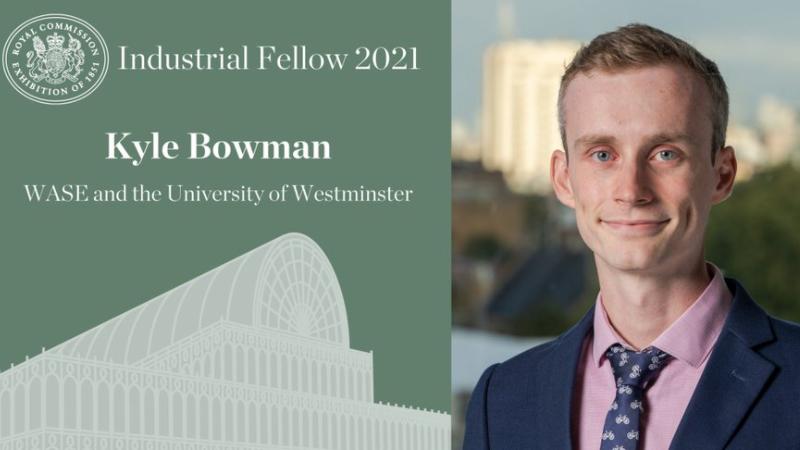Kyle Bowman, a PhD student working with the Applied Biotechnology Research Group at Westminster, has been awarded an Industrial Fellowship by the Royal Commission for the Exhibition of 1851 for his project hoping to help turn wastewater into energy.

The Royal Commission for the Exhibition of 1851 has awarded prestigious fellowships to talented young innovators from across the UK to develop solutions to some of society’s biggest challenges, from COVID-19 to climate change. Kyle Bowman will be working with his supervisors from Westminster, Dr Godfrey Kyazze, Reader in Bioprocess Technology and Professor Izzet Kale, Head of the Department of Engineering in partnership with industrial supervisors Dr Thomas Fudge and Will Gambier from WASE Ltd to accelerate the development of turning wastewater into energy.
Through his research, Kyle will investigate how the electro-methanogenesis process can be optimised to increase energy recovery and reduce treatment time of wastewater when compared to conventional anaerobic digestion, a process through which bacteria break down organic matter like wastewater and food waste.
Electro-methanogenesis is a form of energy technology, where electrical current, hydrogen and carbon dioxide are biologically converted into methane. The hydrogen and carbon dioxide are generated from organic waste such as wastewater, while electrical current can be obtained from renewable sources like solar panels. The converted methane can then be used for generating electricity for everyday activity including cooking and lighting.
Kyle and his team of supervisors hope that this project will enable the production of vessels for growing organisms, known as bioreactors, that manage themselves using artificial intelligence and biosensors to maintain continuous and stable methane production. The project will therefore help to make it more affordable and accessible to turn all waste into energy, clean water and agricultural inputs globally.
Stage one of the project will consist of Kyle and his supervisors developing a unique microbial culture, a method of selecting unique types of beneficial bacteria to optimise the start-up and treatment efficiency of electro-methanogenic reactors. The team will then characterise the electrical response of these microbial cultures to organic matter concentrations in order to create detection systems known as biosensors to increase efficiency and prevent system downtime.
In the final stages, Kyle and the team will analyse the economic performance of the electro-methanogenic reactors and anaerobic digestors to determine the best raw materials for fuel and usage scenarios for the technology.
Talking about the industrial fellowship, Dr Godfrey Kyazze said: “This is an exciting opportunity to translate research on electro-methanogenesis from the lab into the field to generate impact, which is a key research agenda at the University of Westminster.”
Professor Izzet Kale added: “I am delighted with this excellent outcome for Kyle and how this cross-disciplinary research on electro-methanogenesis is going to make a game-changing difference for the better around how organic waste is handled in the future for a more sustainable environment.”
Industrial Fellowships provide graduates in science, engineering and medicine with significant funding towards PhD fees and salary, enabling them to conduct research whilst gaining industrial experience. This allows companies to conduct new research that furthers their business objectives and accelerates the creation of exploitable IP, whilst enabling universities to undertake research that delivers tangible impact.
Find out more about the awarded projects on the Royal Commission 1851 website.


